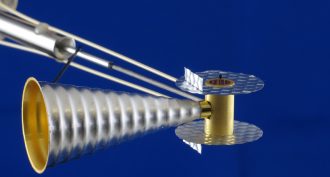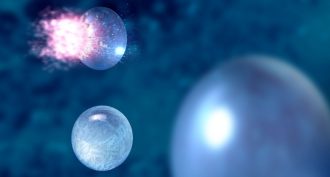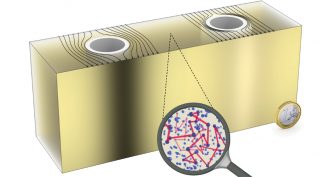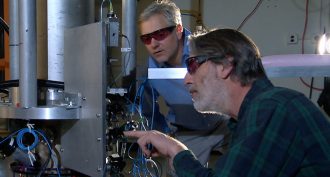Physics
-
 Physics
PhysicsSmooshed diamonds: A window into exoplanets?
Scientists have compressed diamonds more than ever before. Their carbon may give clues to what conditions might be like deep within planets way beyond our solar system.
-
 Fossils
FossilsMega-bird!
What may have been the bird world’s biggest flier ever had wings so long, they would have had trouble flapping fast enough to keep it aloft in tough winds. But this behemoth would have been able to soar both far and fast.
-
 Health & Medicine
Health & MedicineSunlight makes pleasure chemical in the body
A day on the beach might deliver more than a tan (or sunburn). It may also release potent brain chemicals that leave people with a pleasurable feeling.
-
 Physics
PhysicsVery-sub-zero water
Using lasers, scientists measured the temperature of water droplets that remained liquid even when super-cold.
-
 Physics
PhysicsHazing: How to hide in nearly plain sight
A new system takes advantage of a translucent fog of particles to hide otherwise obvious objects.
-
 Tech
TechDigital displays get flexible
Flexible and unbreakable digital displays could soon be for sale, thanks to a new organic transistor made from plastic.
-
 Tech
TechDigital lighting goes organic
An environmentally friendly lighting technology promises not only to save energy but also to transform our indoor environment.
-
 Computing
ComputingElectricity: Cutting the cords
Engineers are working to charge more wireless gadgets — without relying on cords and plugs.
-
 Physics
PhysicsStudent radiation experiment goes to space
The Exploration Design Challenge asked students to design shields that would protect astronauts from radiation. Teachers can still involve classes in the challenge.
-
 Physics
PhysicsQuark quartet forms exotic particle
Quarks are important building blocks of matter, usually bound together as pairs or triples. Now some have formed a quartet. Scientists confirmed the existence of a particle made of four quarks stuck together. Such strange stuff may have been more common in the earliest universe, the scientists say.
-
 Space
SpaceDead star makes a lens for its companion
Much like the lens on a camera, the intense gravity of a newfound white dwarf bends light. In this case, it is distorting light emitted by the star it orbits.
-
 Physics
PhysicsWorld’s coolest ‘clock’ is also crazy-accurate
This is the time to beat — the world’s most accurate atomic clock ever. At its heart is a ‘fountain’ of cesium atoms chilled nearly to absolute zero!
By Janet Raloff